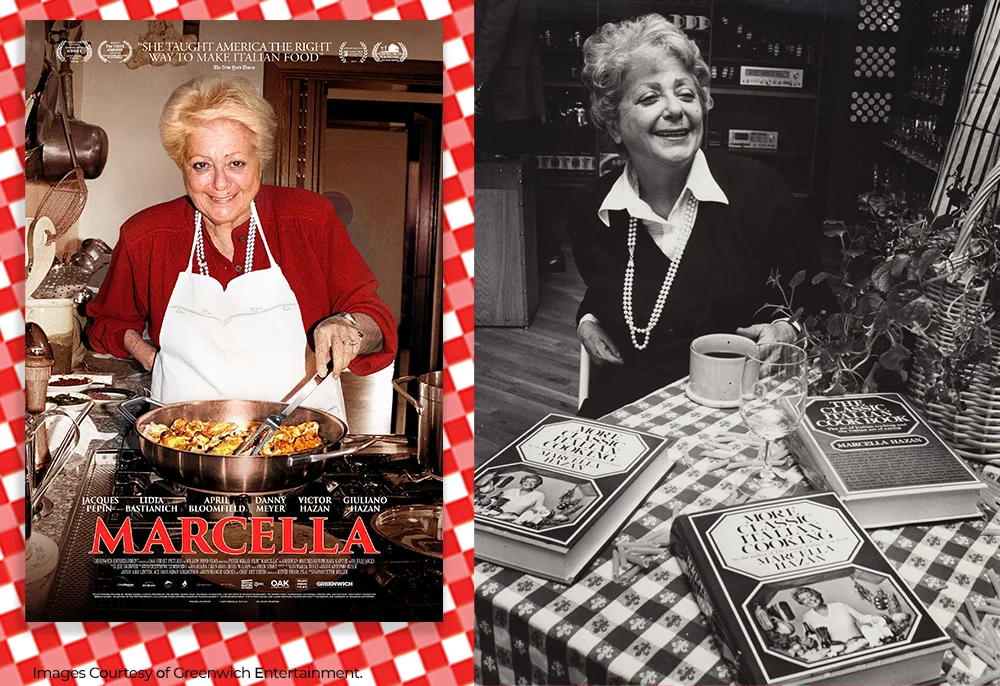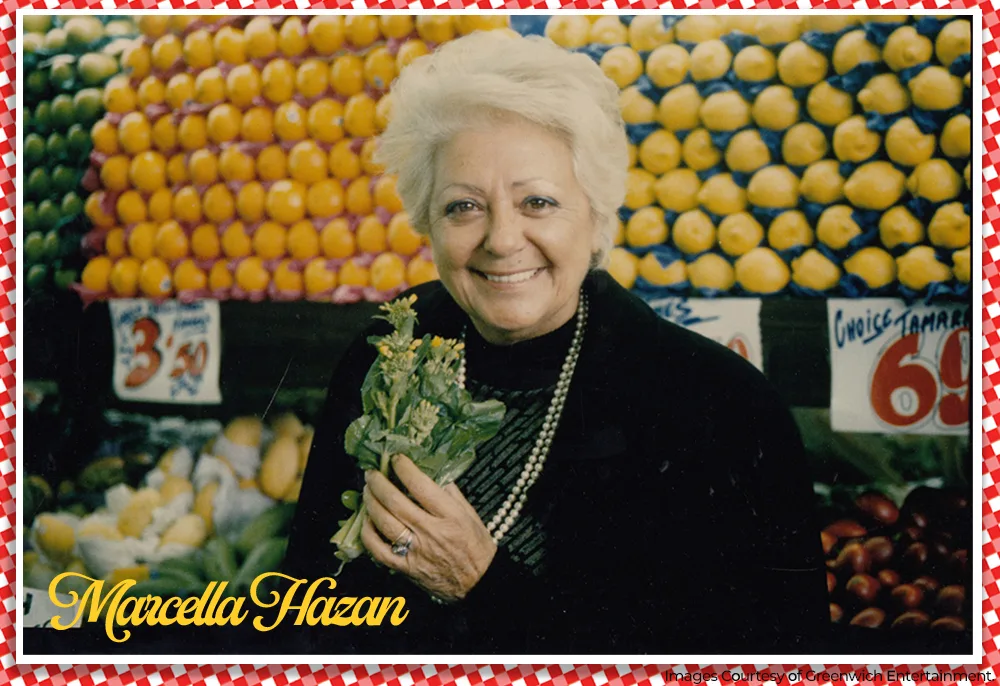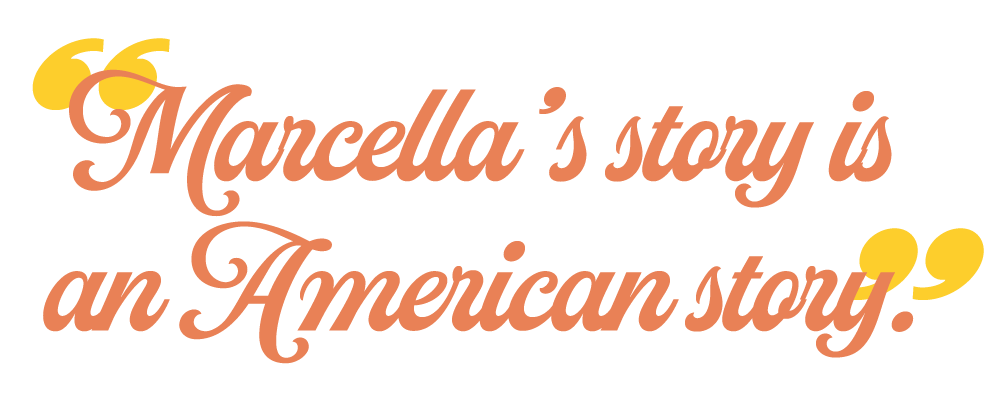Marcella Hazan’s Secret Sauce: A Conversation With Filmmaker Peter Miller
By Ian MacAllen on Wednesday, May 7th, 2025 at 8:52 am | 4,803 views

Marcella Hazan helped launch modern Italian cooking in the United States through her cookbooks The Classic Italian Cookbook, first published in 1973, and More Classic Italian Cooking (1978). The two volumes were later combined into Essentials of Classic Italian Cooking, and Hazan also released a half dozen other titles. She reinvented the very concept of Italian cuisine, at least in America, displaced Italian American dishes, and created new idea of “authentic” Italian food.
Filmmaker Peter Miller was preparing one of her recipes with his wife when they wondered aloud whether anyone had made a documentary about Marcella Hazan. He and his wife often cooked from Hazan’s books, and after realizing nobody had yet made a film about her, he set to work.
I first spoke with Miller in September of 2022 when he launched a fundraising campaign to complete the film. At the time, much of the film had already been shot but he needed funds to finish off key scenes and then edit the film. Since then, he has completed the film and started showing it around at film festivals. I followed up with him to discuss the final cut of the film, Marcella’s philosophy, and what she means to the broader culinary tradition.
The film, Marcella, will be released in cinemas, DVD, and video-on-demand on May 9, 2025 with premieres in New York City, Los Angeles, and other cities, and a national telecast on PBS American Masters in July. I caught up with Peter over Zoom one afternoon to talk about the film.
***
Red Sauce America: How did you come to choose Marcella Hazan as the subject of a film?
PETER MILLER: My wife and I have been cooking for Marcella’s recipes for many decades. We will go to our kitchen, look in the fridge at whatever I got at the farmer’s market that morning, and I’ll ask: what would Marcella do? Marcella is this presence in our consciousness and our lives. And we cook her recipes.
And it’s not just that we follow her recipes, but she also taught us how to think about food, how to buy food quality ingredients, in season. When I make vegetables, I’m making them the way that she taught me. When we cook pasta, when we make a sauce, she’s a presence. Somehow Marcella has really become a part of our vocabulary.
When you read her recipes, there’s that voice of hers, which is gentle, and encouraging and scolding, and precise.
We had dreamed of going to Venice to take her cooking class, but could not afford that. But one night in the ‘90s, we went to the Connecticut suburbs. She was giving a class at a cooking school, and we got to meet Marcella, at a two-hour class.
It was a thrill, because here’s this person whose voice has been in our heads, and we’re actually meeting her in person. And she prepared a magnificent meal. Her son Giuliano was there, he was doing the cooking, and her husband Victor was there, and he was choosing the wines. It was wonderful.
We approached Marcella a little nervously. But this is what I do, I’m a filmmaker, I’m fearless. I go and say: very nice to meet you. My wife says: I’ve been making this recipe of yours many times, when I get to the very end of it, sometimes the sauce breaks. Marcella looked at her and said: the sauce does not break.
Basically, what Marcella said was: the problem is not the recipe, it’s you. We thought, oh, we’ve been insulted by Marcella, our life is complete.
I learned in that two-hour class a ton about recipes and about ingredients and about philosophy. And fast forward to about five or six years ago, we’re in our kitchen with a bag of stinging nettles I’d gotten at the farmer’s market on 97th Street—What do you do with stinging nettles? We look in Marcella’s book: you could put them in ravioli. We boil the nettles, we make the dough, and we roll the ravioli. Hours are going by.
We had a bottle of red wine and after a couple of glasses, we look at each other and my wife asks: has anyone ever made a documentary about Marcella? As a documentary maker, a light bulb went on over my head.
The next morning, I shot emails off and made phone calls to Giuliano, her son. He loved this idea. He said: You got to talk to my dad.
I was so happy to learn that Victor was still with us. He was in his early nineties at the time. I called Victor and said, I’d love to think about a documentary about Marcella. Victor told me he was going to be in New York soon — he lives in Florida — and suggested we film an interview.
The number one rule of documentary filmmaking is if somebody is over 90 and you really want to get them on camera, you should film them very soon.
I filmed my first interview with Victor in 2019, and then shot interviews with a handful of other friends and admirers of Marcella. By 2020, with the pandemic, I couldn’t visit people’s homes to film. A couple of years went by before I could resume shooting. Meanwhile, I was gathering archives. I was doing research. I was trying to keep it going.

Red Sauce America: Do you think the interruption where the only thing you could do was archival research helped the film in the end?
MILLER: Marcella had published a memoir back in 2008 called Amarcord, [meaning, “I remember” in the dialect of Emilia-Romagna]. I read that book and I learned her story and I talked to people and I pre-interviewed people. And I gathered hundreds of historical photos and hours of archival film.
And one of the things I discovered is that while I’ve been making biographical and historical documentaries for a long time, I had never made a film about cooking. This a story of Marcella’s life, and her personal story is really the central story of the film. It is the incredible, improbable journey of an extraordinary woman.
But it’s also a film about cooking. I realized that I needed to film people cooking, making Marcella’s recipes in their kitchens. I would interview somebody, but I would also have them prepare a dish.
Red Sauce America: How did you decide on what they cooked?
MILLER: I asked them. I asked April Bloomfield, who’s a great restaurant chef, if she can cook anything from Marcella’s recipes for us on camera. And she said, I want to do the tomato sauce. This tomato sauce involves three ingredients: it’s tomatoes, onion, butter, and salt. I thought, am I squandering her talents? But she made the most exquisitely delicious version of that sauce I’ve ever had.
The thing that I caught from April was not just that she chose a very simple dish, and then prepared it perfectly. It was also that she explained the philosophy of how Marcella approaches a recipe and ingredients. She became emotional in the course of telling the story because she was so connected to Marcella on a spiritual level, that cooking her dish and talking about her made her choke up.
I filmed with a magnificent chef in Philadelphia named Shola Olunloyo. He’s a Nigerian-American chef who works at a very high level doing experimental cuisine. He wanted to cook Marcella’s chicken with two lemons, which is the simplest recipe on the planet. It’s a chicken, two lemons, salt and pepper, period. But you have to follow her instructions. And you have to keep the oven at the right temperature. You have to prepare the chicken the right way and turn it the right direction; the recipe is very simple but extremely precise.
He says this is the one recipe that he encourages people to do because it shows them what they are capable of doing. People who are not great chefs can make this fantastic dish. But again, it was prepared by a magnificent chef, it was the best version of that recipe that I’ve ever tasted.
Red Sauce America: The recipe that Steve Sando made— is that a Marcella recipe or is that just him using the beans?
Miller: It’s Steve Sando using Marcella Beans. He’s a bean virtuoso whose company, Rancho Gordo, created a whole world of artisanal heirloom beans. Steve’s beans are this wonderful contribution to culinary culture. And he tells the story of Marcella reaching out to him in the early e-commerce days, and asking him if he could possibly grow beans from her childhood, a special soft skin white cannellini bean called Sorana, from this one tiny region of Italy.
When Steve prepares the beans on camera, he’s cooking Marcella’s beans, but he’s cooking them his own way. And he’s cooking them with Marcella’s philosophy in his head. It’s very simple. They’re very unadorned. He boils the beans, he puts salt and olive oil on them, and serves them on homemade bread topped with a perfect piece of local charcuterie.
When Steve prepared that dish, it was very much him channeling Marcella’s philosophy. And at that point in the movie, I’m ready to have somebody say, the lesson from Marcella is partly about following her recipes, but it’s also about following her philosophy of how to cook and how to source ingredients.
The fact that he’s making these beans on wonderful bread, without too much adornment with very good olive oil and with a slice of lardo that comes from the charcuterie down the road where they hand craft these things is really the spirit of Marcella, even if it’s not her recipe.
To me, the bigger message of Marcella, and the message of the movie, is: it’s not just about how to cook Italian food well, it’s about how to approach creativity and life and how we think about what we do. The simplicity, the respect for tradition, respect for history and wisdom and expertise, all of that, is what Marcella taught us. It doesn’t have to be fancy or complicated, but there is truth, and there is knowledge and wisdom. And if you follow it, you’ll have a great experience.

Red Sauce America: How did you track down Marcella’s former students?
MILLER: A lot of this was Victor Hazan. And Victor has been the keeper of the Marcella flame. Early in the process, after I interviewed him, I said: Victor, who would you speak to if you were me? And he said: well, you have to talk to Dorothy Kalins and you have to talk to Pamela Fiori.
And then I interviewed Dorothy who said: you’ve got to talk to Steve Sando. Do you know about his beans?
But I realized I had to go to Italy because so much of her story takes place there, her childhood, but also when Marcella and Victor returned to Italy and lived in Venice for a long time.
I was able to somehow scrape together the resources to hire an Italian crew, get myself over there and film for a few days in her hometown in Cesenatico and in Venice and go to the places that were important to her and talk to people who knew her, the restaurateurs who she helped get off the ground, her friend who takes us to the little local farmer’s market in Cesenatico, Giuliano taking us on a kind of walk around the places that were important to her in her hometown. It changes the vibe of the film to be in the place where she came from.
Marcella’s story is an American story.
If you go to Italy and you say, what do you think of Marcella Hazan? Most people will say, who? Because they don’t know her work, they don’t need her there. We need her here because nobody knows how to cook Italian here until she came along and taught us.
In Italy, people learn cooking from tradition and from their family. But Marcella is the teacher of people like me. I don’t have a Nonna who can tell me how to make the sauce, but I can learn from Marcella. She is this translator of Italian culture to America.
And her husband, Victor, is so central to the story because he is the translator, literally, of her brilliance into prose. And his prose is some of the most elegant, eloquent prose you’ll ever run into.
The combination of Marcella’s brilliance and her ability to teach, and Victor’s ability to put it into beautiful writing is really the secret sauce that makes her books and her recipes so powerful.
Red Sauce America: When Marcella she starts becoming famous and writing cookbooks, even at that time, Italian American food was really not quite the high-end cuisine it is today. How much do you think Hazan’s presence helped change the perception of that, helping to make Italian food, the fine dining experience it’s become?
MILLER: Marcella came to America at a time when, you know, there was spaghetti and meatballs and where your Parmesan cheese came in a green cardboard container. I mean, that’s what my memory as a child of Parmesan cheese was, made by Kraft. She couldn’t find extra virgin olive oil.
Marcella begins writing cookbooks and teaching cooking at a time when the country is ready to receive this message about in seasonal ingredients, about quality ingredients, about using extra virgin olive oil, about ingredients like Parmigiano-Reggiano or balsamic vinegar, things that Americans just plain didn’t know about. And she publishes these extremely successful cookbooks that introduce us to these ingredients and to these approaches and to the idea that Italian food from Italy isn’t the Italian American food that we knew from Italian restaurants here.
I don’t think she had a mission other than the fact that she loved the food where she came from. And she would teach you how to make spaghetti, or she’d teach you how to make meatballs, but she wouldn’t teach you how to make spaghetti and meatballs because that wasn’t a dish that you’d find in Italy. I think she really had an outsized influence on changing the way Americans perceived Italian food that moved it from the Italian American template to something much more authentically Italian.
And that is her great contribution.



